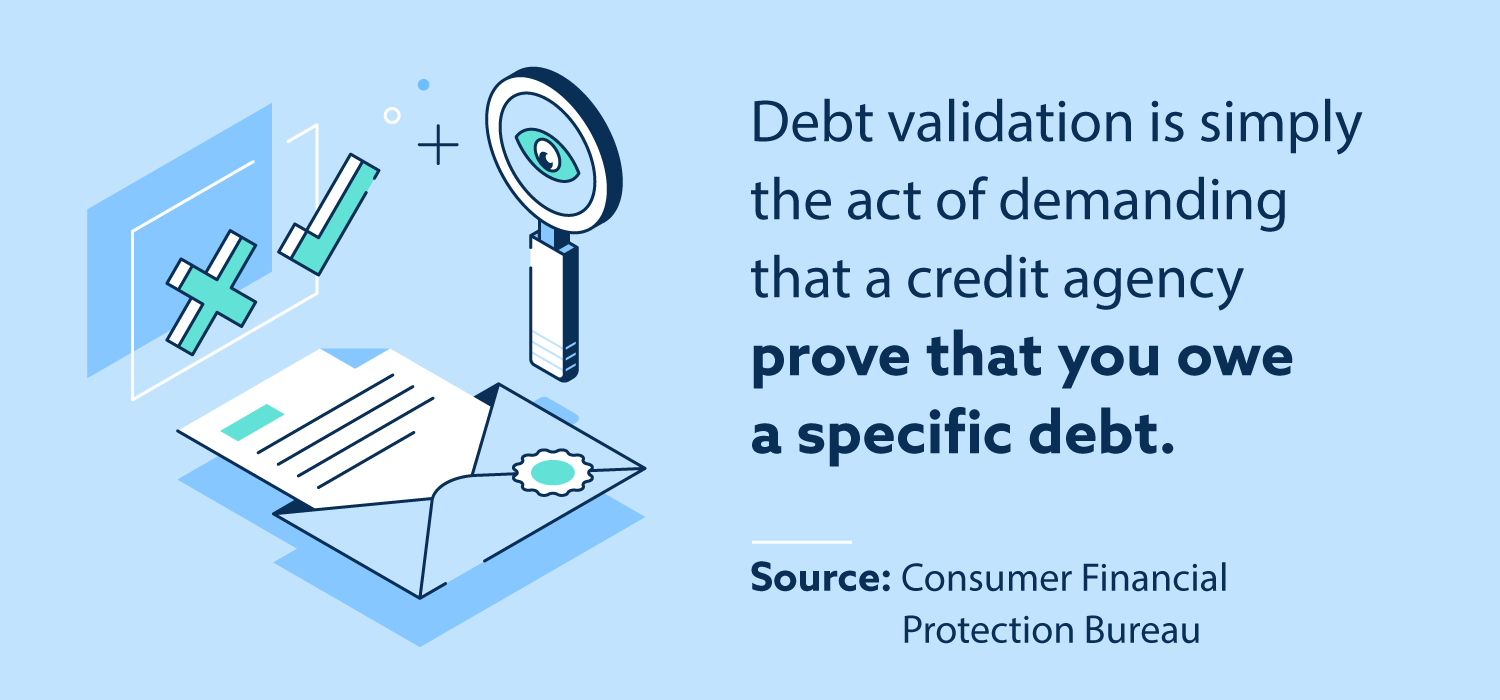
The information provided on this website does not, and is not intended to, act as legal, financial or credit advice. See Lexington Law’s editorial disclosure for more information.
A debt validation letter is written communication in which you demand confirmation you have an outstanding debt.
To help prevent errors, debt collection agencies must follow specific state and federal laws when contacting you about debt or reporting negative information about your borrowing habits to the three major credit bureaus. This is why debt validation letters are so important. If you’ve been contacted by a collection agency but never received a debt validation letter from them, you should request proof that the debt is both legitimate and accurate. To help you, this guide covers everything you need to know about debt validation.
What is a debt validation letter?
A debt validation letter is written communication in which you demand to confirm you have an outstanding debt. The Fair Debt Collection Practices Act (FDCPA) gives everyone the right to request verification of the debt from the collection agencies before attempting to collect it or making a derogatory report about it on someone’s credit report. If you’ve been contacted by a collection agency, you can expect them to send you one of these letters within five business days.

What a debt validation letter reports
A debt validation letter reports the specifics of your debt from a collection agency. The letter reports what you owe, who you need to pay and when you must pay.
The letter needs to include very specific information:
- The company or person you owe money to
- The date you entered into a financial agreement with the creditor
- How much money you currently owe on the debt
- When you’re required to pay the debt before the agency escalates the case
Why you need a debt validation letter
Debt collectors may attempt to collect a debt from you without sending a debt validation letter. If this happens, you have the right to request the agency provide you with proof you owe the money before they can report the debt to the credit bureaus. Debt collectors must provide written evidence of how much you owe via a debt validation letter. Without this documentation, a collection agency will have a hard time proving you owe a specific amount.
Why does debt validation matter?
There are several reasons debt validation is important.
The debt might not be yours
It’s not uncommon for debt collection agencies to misreport debts. They may be attempting to collect money from you after you’ve already paid the debt or seeking the payment of a debt that doesn’t belong to you. A debt validation letter can reveal inaccuracies in their reporting and make them cease their efforts to obtain money from you.
You may be dealing with a scammer
Cybercriminals are becoming increasingly complex in how they target people. One common scam is to threaten victims with legal action if they don’t pay a debt that doesn’t exist. The tax debt scam is one of the most well-known versions of this scam, in which criminals pose as the IRS and threaten to arrest people if they don’t pay a tax debt.
Some scammers impersonate debt collection agencies, so you’re within your rights to request that anyone attempting to collect a debt from you prove they are who they say they are and that the debt is legitimate. States have credit repair laws to protect from similar scams as well.
It could save you money
If the debt collector doesn’t validate your debt properly, you may have grounds to sue if the collection agency purposefully provided false information to reactivate old debt. You need to be careful about how you communicate with debt collectors, because if you admit that a debt is yours and make a payment on it, they may be able to restart the timer on its statute of limitations, which means you would be responsible for the debt for longer.
What if you didn’t receive a debt validation letter?
If you didn’t receive a debt validation letter, you can begin to build a case against the collection agency. The first step is to explicitly ask for a debt validation letter. The FDCPA makes it illegal for agencies to deny your request, so you could gain the right to sue the debt collector if they don’t comply.
When you send your request, keep a copy for yourself and use certified mail to confirm delivery. If you don’t receive your letter in a timely manner, you can also report the debt collection agency to the authorities. You may be helping others who are victims of unfair debt collection practices in the process because the government may fine the debt collector or build a criminal case against them.
What is a debt verification letter?
A debt verification letter is a letter you can send to dispute the details of a debt. For instance, if you receive a debt validation letter that states you owe $5,000 on a debt but your records indicate you only owe $2,000, you can send a debt verification letter to demand that the agency report the correct amount. You can also send a debt verification letter to dispute the entire debt if it’s not yours, and the agency has the burden of proving that you really owe what they say you do.
Debt validation vs. debt verification: What’s the difference?
These terms are sometimes used interchangeably, but the main difference between debt validation vs. debt verification is who sends the letters. Generally speaking, debt validation letters are sent by creditors and collection agencies to prove a debt exists, while debt verification letters are used to challenge a debt’s existence or details. This means that the creditor should send you a debt validation letter, and you might respond with a debt verification letter.
Should you send a debt verification letter?
Once you’ve received a debt validation letter, the debt collection agency will assume the debt is accurate if you don’t challenge it within 30 days, whether it actually is or not. Even if the debt is legitimate, you may still benefit from sending a debt verification letter. The reason for this is that many debts are reported inaccurately, and you can force the agency to do extra work before they can attempt to collect the debt.
You can use your debt verification letter to ask the collection agency to stop trying to contact you, even if the debt is legitimate. This strategy won’t relieve you of your responsibility to pay the debt, but it could give you some peace of mind as you work to deal with it.
How to write a debt verification letter
It’s important to be as professional, clear, and concise as possible in a debt verification letter. You might need to use this letter later for proof that you asked for verification of the debt, so you don’t want to complicate the issue or use inappropriate wording.
Instead, keep it as brief as you can, including only what you need for the verification request. That includes:
- What debt you’re writing about
- That you’re requesting verification under the FDCPA
- What information you’re requesting (such as proof the debt is yours, proof they have the right to pursue this debt in your state and whether the debt is past the statute of limitations)
- That you dispute the debt and request it be removed from your credit report (if applicable)
- Your request that the creditor stop contacting you about the debt via phone or in writing, if desired
Editable debt verification template
Use the following debt verification template from the Consumer Financial Protection Bureau to ensure you are including the correct information.

Follow up with the collection agency
There are some steps you can take after the debt has been verified, depending on your situation.
If the debt is verified
Depending on when your debt went into collections, the negative mark will disappear from your credit report after seven years have passed. Many people believe paying the debt can improve their score, but this isn’t always the case. Fortunately, your collection accounts will lose weight over time until they drop off your report entirely.
It’s important to note that as we mentioned, if you do owe the debt, the collector can still work to collect it by filing a lawsuit or taking other steps, even if you demand they stop calling you.
Another option is to attempt to negotiate a pay for delete agreement. This is a payment in exchange for the debt collection agency removing the mark from your credit report. Credit bureaus are beginning to deter agencies from removing information in exchange for paying off a debt, however, so your attempt to get the debt collector to agree to this could fail.
If the debt isn’t verified
If the debt isn’t verified, it’s likely wrongfully harming your credit. You should begin taking steps to repair your credit. Obtain your credit report from all three credit bureaus and then challenge the inaccurate information. If the collection agency isn’t acting lawfully in its attempt to collect an illegitimate debt from you, there are additional legal steps you can take.
For example, you can sue a company for up to $1,000 if it violates the FDCPA, and you can collect this penalty for each violation the company commits. Before you decide to file a lawsuit, though, you should consult with a professional about which actions make the most sense for your unique circumstances.
And if you’re looking to repair your credit, Lexington Law Firm could help you take steps in the right direction. Get in touch with our team today to learn more.
Note: Articles have only been reviewed by the indicated attorney, not written by them. The information provided on this website does not, and is not intended to, act as legal, financial or credit advice; instead, it is for general informational purposes only. Use of, and access to, this website or any of the links or resources contained within the site do not create an attorney-client or fiduciary relationship between the reader, user, or browser and website owner, authors, reviewers, contributors, contributing firms, or their respective agents or employers.
